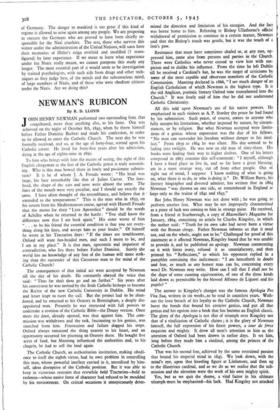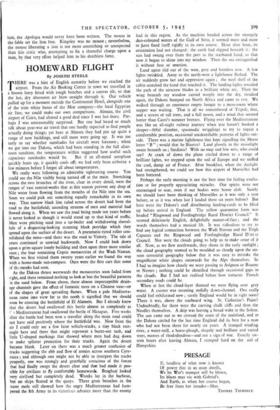NEWMAN'S RUBICON
By R. D. LLOYD
JOHN HENRY NEWMAN performed two outstanding feats that contributed, more than anything else, to his fame. One was achieved on the night of October 8th, 1845, when he threw himself before Father Dominic Barberi and made his confession, in order to be allowed to enter the Catholic Church. The next day he was formally received, and so, at the age of forty-four, started upon his Catholic career. He lived for forty-five years after his admission, dying at the age of eighty-nine in 189o.
To him who brings with him the means of seeing, the sight of this English clergyman at the feet of the Catholic priest is truly astonish- ing. Who is this man bowed there in lowly and passionate submis- sion? It is he of whom J. A. Froude wrote: " His head was large, his face remarkably like that of Julius Caesar. The fore- head, the shape of the ears and nose were almost the same. The lines of the mouth were very peculiar, and I should say exactly the same. I have often thought of the resemblance, and believe that it extended to the temperament." This is the man who in 1833, on his return from his Mediterranean cruise, agreed with Hurrell Froude that the motto for their " Lyra Apostolica " should be the words of Achilles when he returned to the battle: " You shall know the difference now that I am back again." His sister wrote of him " . . . to be his friend the essential condition is that you see every- thing along his lines, and accept him as your leader." Of himself he wrote in his Tractarian days: " If the times are troublesome, Oxford will want hot-headed men, and such I mean to be, and I am in my place." It is that man, egocentric and impatient of contradiction, who lies there before Father Dominic. Surely the world has no knowledge of any feat of the human will more strik- ing than the surrender of this Caesarean man to the mind of the Catholic Church!
The consequences of that initial act were accepted by Newman till the day of his death. He constantly obeyed the voice that said : " Thus far shalt thou go and no farther." Six years after his conversion he was invited by the Irish Catholic bishops to become the Rector of the new Catholic University in Dublin. His mind and heart leapt to meet the call. But the project had to be aban- doned, and he returned to his Oratory in Birmingham, a deeply dis- appointed man. Presently he was entrusted with full powers to undertake a revision of the Catholic Bible—the Douay version. Once more the door, already opened, was shut against him. The com- mission was withdrawn and the task, fascinating to his genius, was snatched from him. Frustration and failure dogged his steps. Oxford always remained the thing nearest to his heart, and an opportunity occurred for planning an Oratory there. He bought five acres of land, but Manning influenced the authorities and, to his chagrin, he had to sell the land again.
The Catholic Church, an authoritarian institution, making obedi- ence to itself the eighth virtue, had its own problem in controlling this man, whose powerful intellect carried in it, unrealised by him- self, ideas disruptive of the Catholic position. But it was able to keep in victorious restraint that erstwhile bold Tractarian—bold to rashness—whose native force of character had refused to be moulded by his environment. On critical occasions it conspicuously deter- mined the direction and limitation of his energies. And the fact was borne home to him. Referring to Bishop Ullathorne's official
withdrawal of permission to continue in a certain matter, Newman said that the Bishop's touch was gentle, but it was the touch of a lion's paw.
Resistance that must have sometimes chafed or, at any rate, op- pressed him, came also from persons and parties in the Church.
There were Catholics who never ceased to view him with sus- picion and to dislike his influence. From the time he left Dublin till he received a Cardinal's hat, he was the target of criticisms by some of the most capable and observant members of the Catholic Communion. Manning declared in i866, " I see much danger of an English Catholicism of which Newman is the highest type. It is the old Anglican, patristic literary Oxford tone transplanted into the Church." It was freely said of him that he did not understand Catholic Christianity.
All this told upon Newman's use of his native powers. He emphasised to such visitors as A. P. Stanley the peace he had found by his submission. Such peace, of course, comes to anyone who fully accepts his limitations, whether imposed by nature, by circum- stances, or by religion. But what Newman accepted were limita- tions of a genius whose expression was the due of his fellows. " No man can surrender his freedom without danger to his intel- lect." From 1859 to 1864 he was silent. His day seemed to be fading into twilight. He was now an old man of sixty-three. His books were finding their way to higher shelves. One of his letters composed in 1863 contains this self-comment: "I myself, although I have a fixed place to live in, and so far have a great blessing. am in a most strange way, cut off from other people. Out of sight out of mind, I suppose. I know nothing of what is going on, what there is to do, or who is doing it." Dr. William Barry, his literary biographer and devoted admirer, has written that in 1864 Newman " was thrown on one side, or remembered in England at large only as the traitor of 1841 and 1845."
But John Henry Newman was not done with ; he was going to perform another feat. What may be not improperly characterised as a piece of luck was coming to him in strange guise. He received, from a friend at Scarborough, a copy of Macmillan's Magazine for January, 1864, containing an article by Charles Kingsley, in which the author said: " Truth for its own sake had never been a virtue with the Roman clergy. Father Newman informs us that it need not, and on the whole, ought not to be." Challenged for proof of this statement as it affected Newman, Kingsley found that he was unable to provide it, and he published an apology. Newman commenting on it with bitter irony, refused it as unsatisfactory, and then printed his "Reflections," to which his opponent replied in a pamphlet containing this indictment: " I am henceforth in doubt and fear, as much as any honest man can be, concerning every word Dr. Newman may write. How can I tell that I shall not be the dupe of some cunning equivocation, of one of the three kinds laid down as permissible by the blessed Alfonso de Liguori and his pupils? "
The answer to Kingsley's charges was the famous Apologia Pro Vita Sua, written in six weeks,.to be read in countless years. With- out the least breach of his loyalty to the Catholic Church, Newman burst the bonds that bound his creative genius, and put all that genius and his egoism into a book that has beCorne an English classic. The glory of the Apologia is not tliat of triumph over Kingsley nor that of a vindication of Catholic claims ; it is the glory of Newman himself, the full expression of his finest powers, a tour de force exquisite and mighty. It drew all men's attention to him as the attention of Oxford had been drawn in earlier days. It set him, long before they made him a cardinal, among the princes of the Catholic Church.
That was his second feat, achieved by the same restrained passion that bound his imperial mind in 1845. We look down, with the mind's eye, upon that kneeling figure at Littlemore, and then up to the illustrious cardinal, and as we do so we realise that the sub- mission and the elevation were the work of his own mighty spirit.
Yes, but as we quit the theme, a vital factor in his ultimate triumph must be emphasised—his luck. Had Kingsley not attacked
him, the Apologia would never have been written. The mouse in the fable set the lion free. Kingsley was no mouse ; nevertheless, the mouse liberating a lion is not more astonishing or unexpected than this critic who, attempting to fix a shameful charge upon a man, by that very effort helped him to his deathless fame.



























 Previous page
Previous page